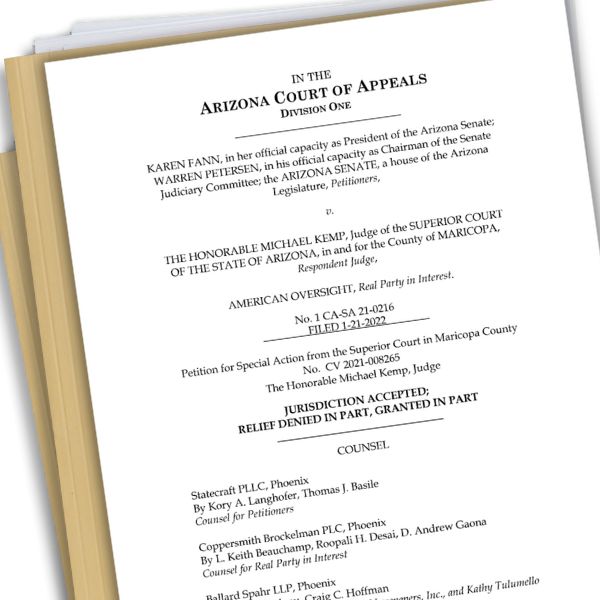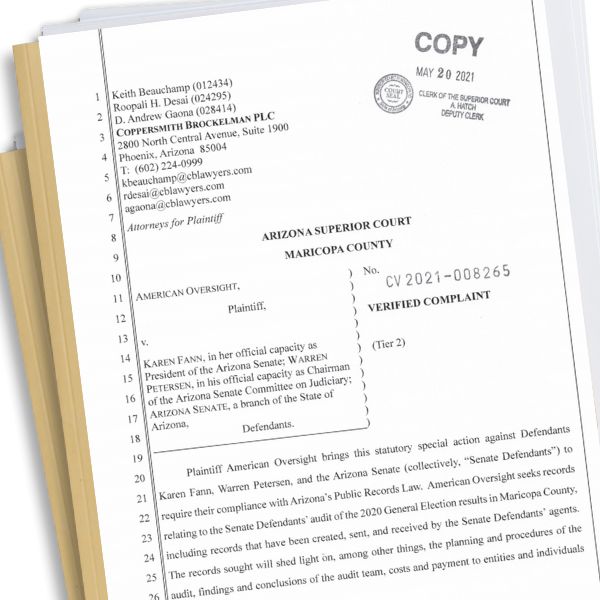
Cyber Ninjas Emails Reveal New Details About Recruitment of ‘Audit’ Volunteers, Involvement of Election Deniers
The records, released by the Arizona Senate on Monday, provide new information about the partisan election review’s partisan bias and its connections to efforts in other states.

On Monday, the Arizona Senate released another set of documents related to its partisan “audit” of the 2020 election. The records, previously held by Cyber Ninjas and released in response to American Oversight’s ongoing litigation, reveal new details about the review’s partisan bias, connections to other states, and Cyber Ninjas’ subcontracts.
The Involvement of Lyle Rapacki
The documents outline the central role played by Lyle Rapacki, a security and intelligence specialist, in recruiting and vetting volunteers for the ballot review. Rapacki, who has worked with Arizona lawmakers for years, was involved in various stages of the “audit” as well as early efforts by election denier Phil Waldron to assist Arizona leaders in finding “fraud” in Maricopa County’s election results. (Recent reporting has highlighted Waldron’s role in pushing for the Trump administration to seize voting machine data after the 2020 election.)
In a March 24, 2021, email, Rapacki provided details about 78 volunteers he had recruited and vetted so far. Included in the email thread were Cyber Ninjas CEO Doug Logan, Waldron, and Gene Kern and Heather Honey of the firm Wake TSI, the subcontractor that led the initial hand counting of ballots. In response to Rapacki’s update, Kern suggested recruiting volunteers from “Christian Colleges in the area” and working with schools to offer students credit for helping with the ballot review. “They must be told upfront that background checks will be conducted to eliminate activists on either side,” Kern wrote.
In his email, Rapacki also indicated that he had circulated an earlier version of his volunteer email “in a back room of twitter” and that it had been “questioned” by Josh Barnett, a current congressional candidate in Arizona. Rapacki said Barnett asked him who he had been hired by, which Rapacki said he “didn’t disclose.”
Barnett communicated with Arizona Senate leaders during the run-up to the “audit,” and appears to have suggested, sometime before April 6, that Senate President Karen Fann “commandeer” a Maricopa County building; Fann responded to him after consulting with legal counsel about the idea, according to documents American Oversight obtained previously, writing that the state legislature had no authority to do so. Barnett also offered legal advice about decertification, which was promoted by Wisconsin state Rep. Tim Ramthun, who has called for his state’s legislature to pursue the legally impossible move of “decertifying” its 2020 election results.
The records also reveal the blatantly biased process Rapacki used in deciding who to recruit for the partisan review. On April 1, in response to an email from Kern about an individual who was interested in joining the “audit” team, Rapacki said he had “no interest” in recruiting them. “I have sufficient concerns of ‘moles’ and likewise worming their way into the process,” Rapacki added. “While we can background check everyone, we cannot successfully check political ideologies and associations.”
On April 15, Rapacki emailed Logan, Kern, Honey, and Andre McCoy — whose name appeared on the “alternate” electoral certificate submitted by Trump supporters in Pennsylvania — expressing concern about several “audit” volunteers who switched their party registration to Republican, but whose Democratic registration from “years ago” remained active. Rapacki was also concerned about whether to hire a volunteer who had four bankruptcies on his record, a decision that he “set aside for someone higher on the flag pole than I.”
Logan replied: “Individuals that registered as both Republican and Democrat is very interesting. We’ll want to know who those people are to keep an eye out for them.” He suggested that based on his reviews of voter rolls, dual party registration is “a technique utilized to allow the democrats to control the primaries.”
Logan’s response also hinted at tension with Ken Bennett — a former Arizona secretary of state who served as the Senate’s “audit” liaison — over how the ballot review should be conducted. In regard to obtaining letters of recommendation for potential ballot counters, Logan wrote, “[T]his is what I was able to come up with on-the-spot when talking with Ken to help reign him in a little bit in a way that should still leave us in control.” In his email, Logan also invited Rapacki to contact him on the encrypted messaging app Signal for future questions.
Connections to Other States
The Arizona “audit” served as an inspiration for similar partisan election investigations in other states. Previously, American Oversight obtained communications between Arizona leaders and leaders in Wisconsin, who later went on to launch their own statewide election reviews.
In Rapacki’s April 1 email to Kern, Honey, and Logan, he mentioned the importance of the Arizona “audit” to activists across the country. “Other states, however, are breathlessly awaiting the findings, as well as watching what they can as to how this is all being arranged and run,” he wrote. “I mentioned to Doug that I have received communications from Michigan Legislative leader wanting to know how they might proceed and I will pass along to Doug said request, as well as to [state] Senator [Sonny] Borrelli.”
Wake TSI’s Rates
Wake TSI, the company that had conducted a post-election partisan “audit” of election equipment in Fulton County, Pa., and was initially hired to lead the ballot count in Arizona, chose not to renew its contract with Cyber Ninjas in mid-May 2021. The records released Monday reveal details about payment disputes, which perhaps contributed to Wake’s departure. A week before Wake’s contract expired, Logan emailed Kern and Wake TSI’s Chris Witt, expressing disapproval over the company’s high expenses.
Logan wrote that “we had discussed … that you be much more transparent about your people and their rates.” He said that Wake had been paying some “audit” workers $200 or more per hour, and it was “obvious” that such a rate was higher than average. “When we go through all of this,” Logan wrote, “I am going to give you a hard time about expenses incurred which were not budgeted and a change order was not brought to me to take care of.”
Involvement of Election-Denying Activists
On March 31, the same day the Arizona Senate announced that Cyber Ninjas would lead the “audit,” Logan, Witt, and Kern discussed the media coverage, with Witt expressing concern about subcontractors speaking publicly about the project. “I have sent a message to all of our employees about not talking to anyone about this project,” he wrote. “Perhaps that same message should go out to all of the delivery parties (especially Jovan). This could get out of hand quickly.”
Witt was referring to Jovan Pulitzer, a conspiracy theorist known for touting destabilizing lies about the election results and who frequently communicated with “audit” leaders throughout the process, as revealed in records previously obtained by American Oversight. In his response, Logan attempted to reassure Witt, writing, “We wanted to be sure [Pulitzer’s] followers knew that he had been consulted. You’ll notice none of his wording said he’d be directly involved, just that his tech / process would be.” On May 6, Cyber Ninjas entered a formal agreement with Pulitzer, and draft contracts had been circulated as early as April.
The records also reveal that Todd Sanders, who helped fundraise for the “audit” through the America Project, was looped into conversations in early April about the ballot review’s budget. Sanders worked on the discredited report on voter fraud in Antrim County, Mich., and is listed as an officer at a company run by Waldron.
It’s been one year since American Oversight filed its lawsuit against the Arizona Senate for the release of public records related to the sham election review in Maricopa County. Through our ongoing litigation, we previously obtained documents that had also been held by Cyber Ninjas, which reveal other details about the firm’s subcontracts, the operation’s high costs, and its links to the partisan election investigation in Wisconsin. More information about our investigation can be found here, and all filings related to the lawsuit can be found here.



